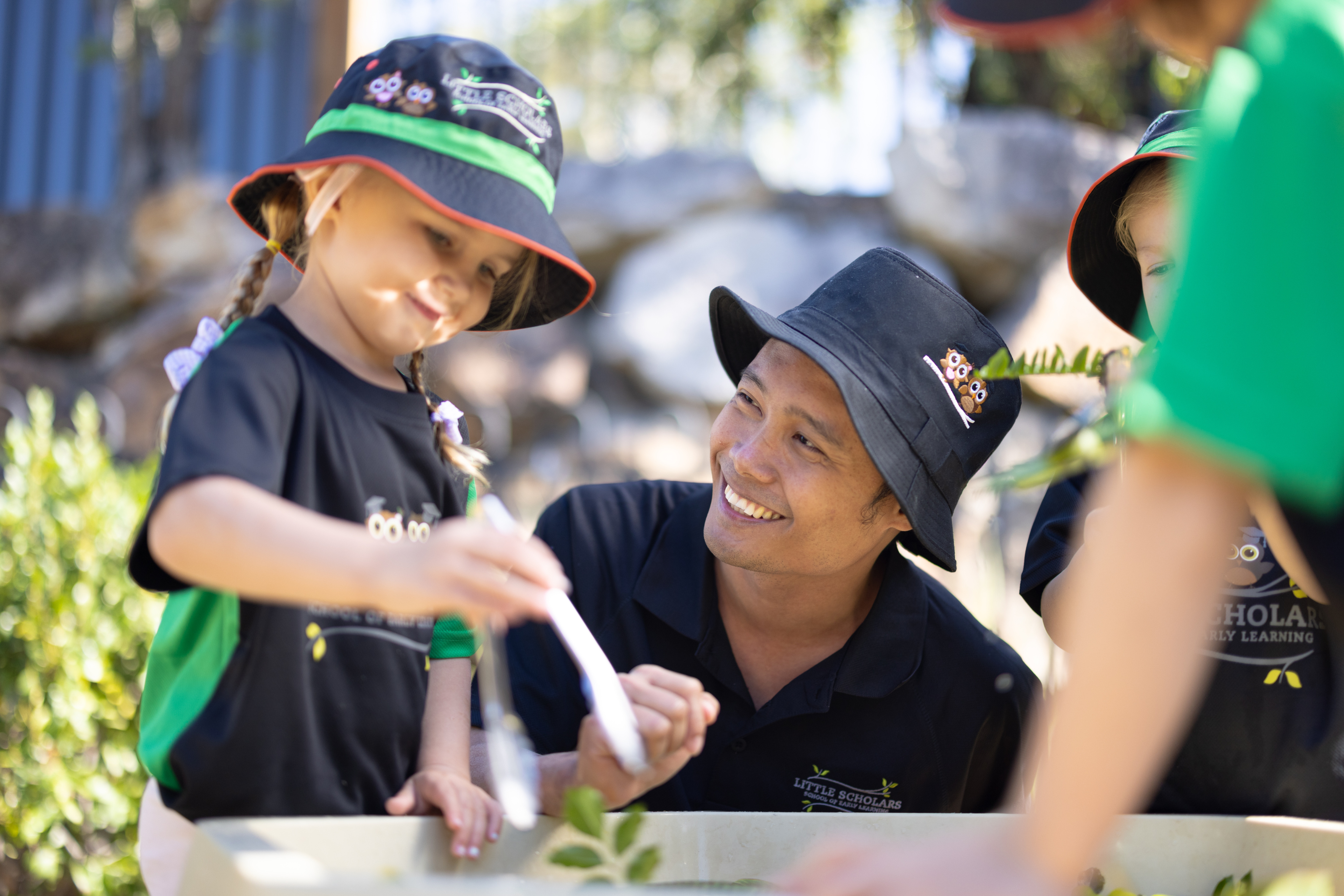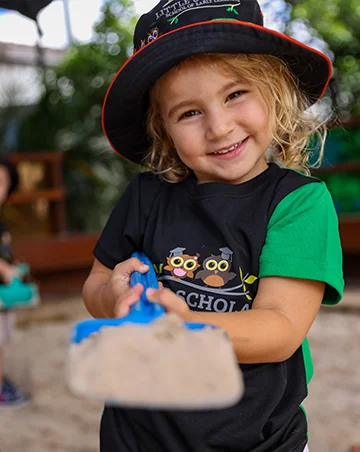At Little Scholars we are dedicated to creating a nurturing, stimulating, and safe educational setting for children. To accomplish this, we have integrated the Reggio Emilia approach into our curriculum. This powerful educational philosophy puts the child at the heart of their learning journey, aligning perfectly with our commitment to compassion, love, and preparing children for life.
This article explores what the Reggio Emilia approach is, how it originated, and how we integrate it into our teaching at Little Scholars.
Little Scholars provides an attractive and safe environment to children on the Gold Coast while giving you total peace of mind while your children are in our care. Learning areas include well-equipped playrooms and landscaped outdoor spaces for maximum learning opportunities. Book a tour today if you are looking for a childcare centre in SE Queensland.
What is the Reggio Emilia Approach?
The Reggio Emilia approach is an educational philosophy focused on early childhood education. Originating from the region of Reggio Emilia in Italy, this approach views young children as curious individuals who have the potential to learn from everything around them.
Essentially, the Reggio Emilia approach places significant emphasis on fostering a strong sense of self, creativity, and cognitive skills through a systematic learning process based on exploration and discovery. It recognises children as active participants in their learning, with their own unique interests, abilities, and the capability to construct their own understanding and knowledge of the world.
The Principles of the Reggio Emilia Philosophy
There are 11 key principles in the Reggio Emilia approach:
- Children as active protagonists: Children are acknowledged as individuals with unique learning potentials and capabilities. They actively engage with their cultural and social contexts, constructing experiences that are meaningful to them.
- The 100 languages: This metaphor refers to the diverse ways children think, express, understand, and encounter experiences. The Reggio Emilia approach values all verbal and non-verbal languages equally, celebrating the myriad forms of learning and knowledge construction.
- Participation: Encouraging engagement and collaboration between children and educators, participation fosters a culture of solidarity, responsibility, inclusion, and transformation. This principle highlights the importance of utilising the “hundred languages” and respecting diverse perspectives.
- Learning as a construction process: The Reggio Emilia approach emphasises seeing learning as an individual and collective endeavour. It encourages children to develop their knowledge, competencies, and autonomies through research strategies, discussion, and collaboration with others.
- Educational research: Emphasising the importance of inquiry, this principle recognises research as a vital component of everyday life for both children and adults. Research drives pedagogical innovation, underpins professional quality, and helps interpret the complexity of the world.
- Educational documentation: Documentation makes learning processes visible and evaluable. It allows for the sharing of insights and experiences among children and adults, contributing to a collective understanding.
- Progettazione/designing: The approach emphasises the design of learning environments, curricula, and professional development rather than implementing pre-defined programmes. This principle encourages a close synergy between the organisation and educational research.
- Organisation: Organisation encompasses the structuring of work, spaces, and time for children and adults. It promotes shared responsibilities across administrative, political, and pedagogical levels, with an emphasis on stability, continuity, and a sense of belonging.
- Environment and spaces: Environments are designed to support togetherness and research. The interplay between architecture and pedagogy ensures spaces are adaptable to children’s learning experiences. Attention to furniture, objects, and activity spaces fosters well-being, familiarity, belonging, and safety.
- Formation/professional growth: Professional development is the right and duty of all staff members. It is integrated into work hours, with opportunities for growth provided at local, national, and international levels.
- Evaluation: The evaluation process is an integral part of the Reggio Emilia approach, encompassing all aspects of school life. Tools and practices, such as documentation, family and community participation, and collaboration with the city’s integrated public system, promote dialogue and interpretation.
The Origins of the Reggio Emilia Approach
The Reggio Emilia approach to early childhood education originated after World War II, through collaboration between early childhood educator and psychologist Loris Malaguzzi and parents in the villages surrounding Reggio Emilia, Italy. They joined forces to create a new type of childcare education that would prioritise community involvement, instil a love for learning, and promote respect. Together, they established and managed preschools that emphasised the significance of community, democracy, and an active role in education. This shared mindset laid the foundation for what we now know as the Reggio Emilia approach.
Over time, the Reggio Emilia approach has evolved, incorporating influences from various sociological and academic ideas. Despite its humble beginnings, this philosophy has gained international recognition for its innovative and child-centred approach, making a profound impact on early childhood education. Today, thousands of schools inspired by the Reggio Emilia approach can be found worldwide, each adapting and implementing the philosophy in ways that resonate with their own specific cultural and community contexts.
Why Choose the Reggio Emilia Approach for Early Childhood Education?
In a world where traditional education can often be rigid and structured, the Reggio Emilia approach offers a refreshing child-centred approach, recognising and valuing children as strong, capable, and resilient individuals who possess innate wonder and knowledge.
- The Role of a Child
As the Reggio Emilia philosophy views children as active creators of their own knowledge, it empowers them by giving them a significant voice in their education. They are encouraged to explore their interests through project-based learning, which enhances creativity, problem-solving abilities, and critical thinking skills. It also cultivates self-confidence and emotional intelligence by facilitating negotiation, collaboration, and conflict resolution. - The Role of Educators
Educators play a crucial role in the Reggio Emilia approach. Instead of being transmitters of knowledge, they become collaborators, co-learners, and research partners in the learning process. They observe and document children’s work, and facilitate group discussions, providing an environment for learning without taking an all-encompassing leader role.
The Reggio Emilia Approach at Little Scholars
At Little Scholars, we embrace the Reggio Emilia approach as it aligns with our philosophy.
We integrate this philosophy alongside Australia’s National Quality Standard for education and the Early Years Learning Framework, into our everyday practices, curriculum, and interactions. Our aim is to create environments that inspire children’s exploration, discovery, and active engagement. In our studios, we purposefully arrange the space to stimulate curiosity, problem-solving skills, and social interaction. Every nook and cranny of our campuses are designed to be a learning space where children can interact with materials, nature, and their peers.
The unique combination of our values and the Reggio Emilia approach not only nurtures cognitive and social skills but also fosters deeper growth. It equips children with a strong moral compass and a deeper understanding and respect for the world they live in.



